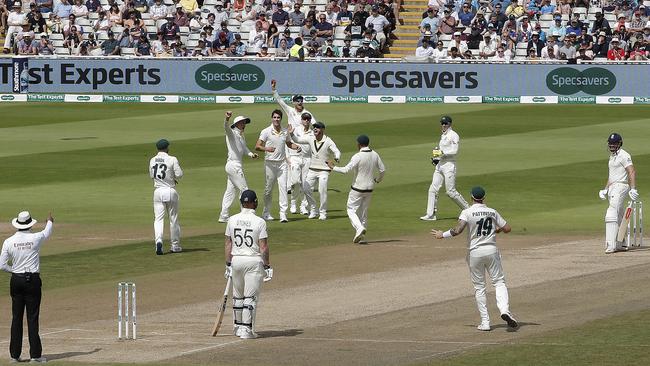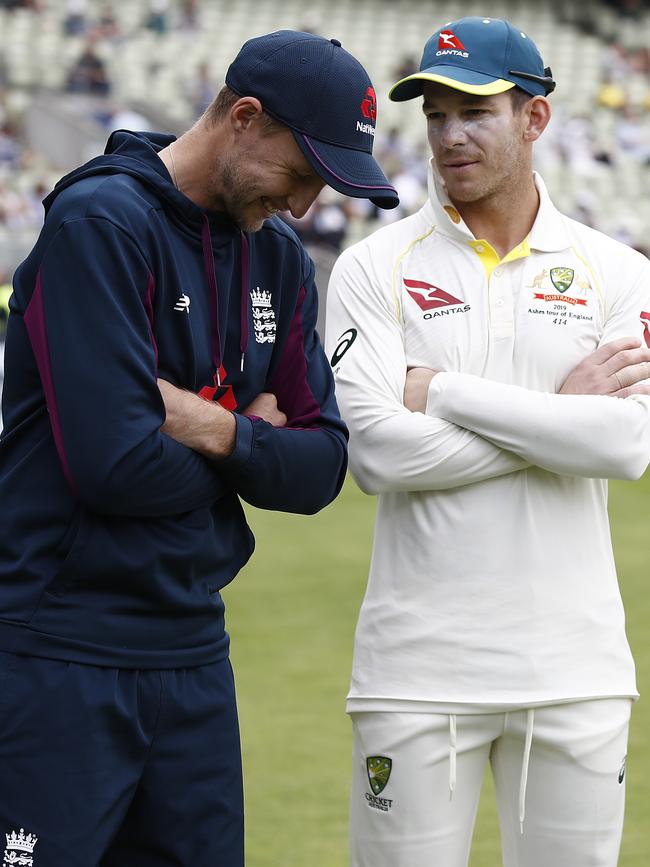
This was a stunning turnaround and victory for Australia. Winning the opening Test of an Ashes series is hugely significant. To do so at a venue regarded as a fortress, one that has been unkind for nearly two decades, the more so. You have to go back to the famous series of 2005 for the last time that an away side did in the Ashes what Australia have done here and, with Tim Paine’s side holding the urn — a drawn series being not good enough for England — Joe Root’s team will need a comeback of similar quality to 2005.
More than that, Australia’s win came after conceding massive early ground. England will look back with bemusement at losing by the enormous margin of 251 runs — repeat, 251 runs — having had their opponents 8-122 on the first day. Who knows whether a fit James Anderson would have enabled them to land the knockout blow then, but even Anderson may have found Steve Smith an immovable object given the form Australia’s No 4 was in.
Smith was named man of the match for his twin hundreds, without which Australia would be going to Lord’s 1-0 down. There was a cameo role for him only on the final day — he came on for a short bowl just before afternoon drinks, halfway through the day, dropped a catch at second slip when Australia were on the verge of victory and then took the winning catch in the same position — and he ceded ground to Nathan Lyon and Pat Cummins, who took all 10 wickets between them. Hostile pace and attacking spin has often been an irresistible combination down the ages, and was so again.

Given that combination was available to Australia, and given the worn pitch, the odds were against England batting out the day, perhaps, but surviving only half of the overs was at the lower end of expectations. Draws have become an endangered species in England, batting for them a lost art, although here only Jason Roy, who charged and was bowled, was noticeably out of synch with the requirement. Instead, Australia’s bowlers were devastating and faced with the need to withstand a tough situation, the defensive play of England’s shot-makers was simply not up to the mark.
Cummins bookended the day with bouncers to take the first and last wickets, Rory Burns initially and then Chris Woakes, who played as competently as any England batsman in making 37. In between, he broke the back of England’s dangerous middle order, by bouncing out Jonny Bairstow as well — the ball brushing the glove, despite Bairstow’s protestations — and then bowling Jos Buttler for his 100th Test wicket. The No 1 ranked Test bowler was a real handful and Australia’s pace attack comprehensively out-bowled England’s throughout. They were, for the most part, quicker and certainly more accurate — not bad, with Mitchell Starc waiting in the wings.
England’s attack will need tweaking in the absence of Anderson. He walked out to bat — gingerly so — at 2.55pm, with only Woakes for company, the situation hopeless and on a hat-trick. The bowler was Lyon, the man who everyone thought would be England’s tormentor on the final day and who proved to be so. Having been short of his best in the first innings, Lyon coped admirably with the expectation of leading his team to victory, bowling superbly through 17 overs from the Birmingham End, from where Moeen Ali had looked so toothless the day before.
More than anything else, cricket is a psychological game and speaking before the final day’s play, Lyon had talked of his “excitement, anticipation” and hopes of having “fun” out in the middle. The weight of expectation can be inhibiting, too, and many spinners over the years have bowled better earlier in a match than later, but Lyon embraced the challenge and took his 15th five-wicket haul in Tests. That he was the premier spinner on either side was not in doubt, England were just hoping the conditions would mask the difference.
Having taken the new ball the night before, Lyon waited an hour to get into the action, but when he did so his impact was almost immediate. Roy had looked comfortable enough facing the spearheads, Cummins and James Pattinson, and had unfurled two good-looking cover drives, but now, in Lyon’s third over, his patience or his judgment, or both, failed him. Hurtling down the wicket and aiming a blow to leg — a choice of shot unworthy of the situation — Roy was bowled, having shown his hand far too early to the bowler. He walked off hurriedly, unwilling to linger and soak up the derision.

There is an art to batting to save the game and it does not involve defending to the exclusion of all else. It is imperative to maintain a positive attitude, to be willing to hit the bad ball, if only because footwork and decision-making are likely to be sharper as a result. But it does require removing excessive risk from batting and it does mean selling your wicket dearly, neither of which formed part of Roy’s choice of shot. It could be argued he was manoeuvred into it by Lyon and Paine, who blocked off his sweep shot with a change of field, but, even so, it was a poor dismissal.
Confidence up, Lyon began to look increasingly dangerous, finding sharp spin and significant bounce from the rough patches in front of the batsmen. With three, sometimes four fielders around the bat, and plenty of runs to play with, he was in his element. Joe Denly, who swept effectively at the start of his innings, was snapped up at short leg and compounded things by wasting a review. Root had already been given out erroneously twice by Joel Wilson, using reviews to overturn both leg-before decisions, but there was no need for further adjudication when he, too, defended into the hands of short leg.

In this DRS age, with umpires more likely to give batsmen out on the front foot, Lyon is a superb operator to left-handers, as England found to their cost two winters ago. He bowled an unplayable ball to Ben Stokes, which spun, climbed and brushed the edge — a fine way to bring up your 350th Test wicket — and was superbly caught by Paine, whose glovework was noticeably tidier up to the stumps than Bairstow’s. Then came Ali, who must now dread facing Lyon, given that he has been dismissed by him nine times in all, who survived ably for 46 minutes before edging low-down to gully.
Ali is England’s main concern as they look to regroup before Lord’s. He is a fine cricketer, and his off-spin and free-flowing batting has been essential to England’s planning at home in the past few seasons, but his record against Australia is modest. He averages a little more than 25 with the bat and a little under 65 with the ball and it is the last number that is most worrying.
Before this match, he wrote that he should be judged for his bowling, given his role in the side, but he bowled poorly here, as he did two winters ago in Australia, and his feebleness with the bat against Lyon will not help his cause. In fast-forward cricket of the type England are looking to play, Ali is a more valuable cricketer but England will be aware of Smith’s significantly better record against off spin, as opposed to left-arm spin.
Fair to say, then, that this Test did not go to plan. Now England must go to Lord’s, where they will want conditions to suit — a greener pitch, in other words, which brings their seamers into play. On bended knee, England’s captain must go, then, cap in hand to the Lord’s groundsman, Karl McDermott, about whose pitch he was less than kind last week after the Ireland Test. Karl meet Joe; Joe meet Karl.
The Times



